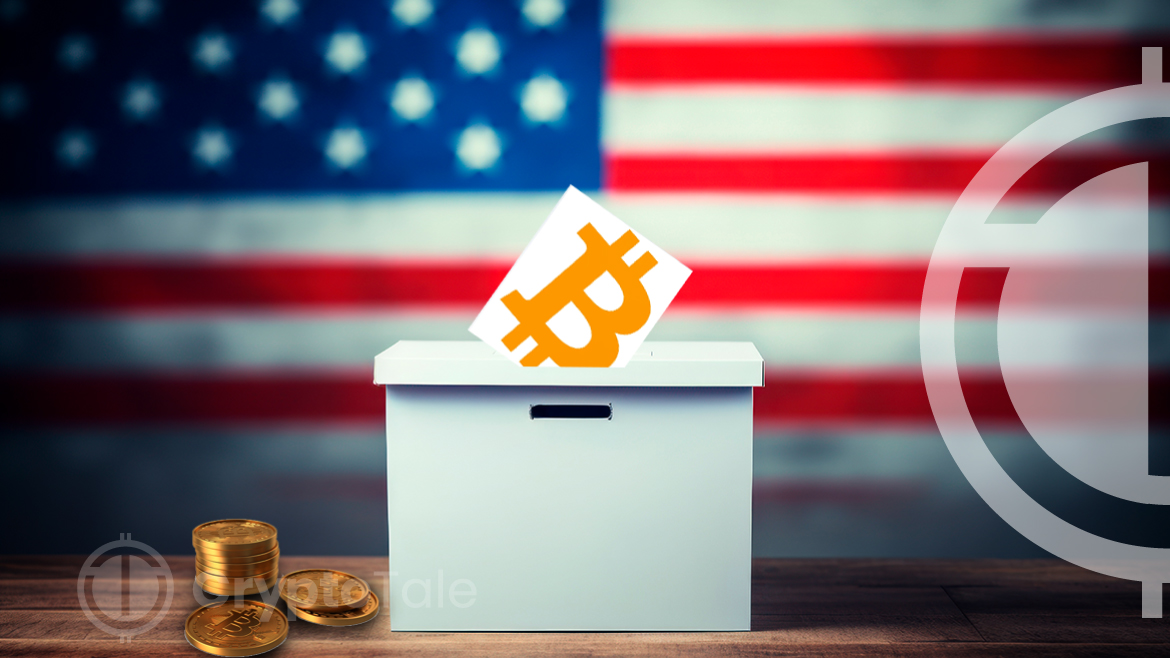Cryptocurrencies have increasingly found themselves at the intersection of technology, finance, and politics in the United States. With the 2024 elections on the horizon, the influence of digital assets and the regulatory environment has become a focal point of political debate. Recent developments such as the aggressive regularity stands of the SEC, high-profile political donations from crypto companies, and the unexpected approval of cryptocurrency exchange-traded funds underscores the correlation between crypto and politics.
Trump Crypto Campaign and Market Influence
Former President Donald Trump’s engagement with cryptocurrency during his campaign has significantly impacted investor sentiment and market dynamics. Initially skeptical of digital currency, Trump has since embraced it as part of his campaign strategy by accepting Bitcoin donations.
If re-elected, Trump has promised to promote Bitcoin and cryptocurrencies. He asserted that Bitcoin will be manufactured in the United States and not exported elsewhere.
Trump also promised to defend for self-custody. In addition to that, he took a stance to keep Elizabeth Warren away from the country’s 50 million cryptocurrency owners and never allowed the development of a central bank digital currency. This is not Trump’s first Bitcoin-related campaign effort; he has previously voiced optimism and openness toward Bitcoin entrepreneurs on Truth Social.
Crypto’s Big Moment in U.S. Politics
A tiny portion of the American electorate uses cryptocurrency. However, it is starting to have a significant impact on U.S. politics and policy.
The cryptocurrency business earned several eye-catching triumphs this month. Washington’s levers of power are sure to grow as it prepares to spend more than $80 million on the 2024 elections. The wins come as the Federal Reserve reported this week that only 7% of individuals stored or utilized cryptocurrency last year, a 5% drop from 2021.
Trump Supports Crypto and Opposes CBDCs in Campaign SpeechSEC Unexpected ETF Approval
The SEC’s unexpected approval of a cryptocurrency exchange-traded fund (ETF) in 2024 adds another layer to the evolving crypto landscape. This decision marks a significant milestone for the crypto industry, as ETFs are seen as a more accessible investment vehicle for mainstream investors. The approval has been lauded as a step towards greater acceptance and integration of cryptocurrency into the traditional financial system.
During the Consensus 2024 conference, Wood emphasized the SEC’s approval of spot Ethereum ETFs, noting the House’s FIT21 and former President Trump’s increased interest in the crypto space. Wood stressed FIT21’s role in making cryptocurrency an election issue and Trump’s support of Bitcoin and other cryptocurrencies. He believes that this political change drew the attention of the Biden administration, resulting in the ETFs’ rapid acceptance.
The SEC has approved rule modifications enabling the listing and trading eight spot ETH ETF funds, including a joint offering by ARK and 21Shares. This unexpected move has caused conflicting emotions in the financial sector since the agency had yet to proceed with the proposed spot ETH ETFs before approval.
SEC’s Belligerent Crypto Regulation
Biden Administration Seeks Balanced Cryptocurrency Regulation
The White House opposes the Financial Innovation and Technology (FIT21) for the 21st Century Act, which governs cryptocurrency markets, citing worries about investor protection. President Joe Biden’s administration has yet to commit to rejecting the legislation, which might benefit the Bitcoin industry.
Unlike prior statements by Securities and Exchange Commission Chair Gary Gensler, the White House favors collaborating with Congress on future crypto-related legislation. The administration has signaled its openness to engage with Congress to create a comprehensive regulatory framework for digital assets that promotes responsible growth and global financial system leadership.
Ripple’s Political Donations
Ripple has made headlines with its substantial political contributions reflecting the growing financial influence of crypto companies; Ripple donated $25 million to a political party. This donation is among the largest ever made by a cryptocurrency and highlights the strategic efforts of digital asset companies to secure favorable regularity conditions and political support.
According to a statement issued on May 29, Ripple has identified the 2024 U.S. election as a critical crossroads for the cryptocurrency industry. In return, the business donated $25 million to Fairshake, a congressional super PAC that supports crypto and innovation candidates.
This payment brings Ripple’s total donation to the committee to $50 million. Notably, Fairshake has received funding from significant cryptocurrency industry players such as Coinbase, Gemini, and venture capital company Andreessen Horowitz.
Trump and Musk Discuss Crypto Policy
Bloomberg reports that if Trump gets re-elected in the United States, he may offer Musk a position as a finance advisor. Despite claims that Musk discussed cryptocurrency policies with Trump, he rejected the claim in a recent X post.
Trump and Musk Political Discussions
According to the Wall Street Journal, Trump and Musk explored methods for the tech tycoon to play a broad advisory role if Trump wins a second term in November, but the specifics of such an arrangement are still being considered. Musk has also spoken with Trump allies about electric vehicles and the space program, which are intimately related to Tesla Inc. and SpaceX, the companies he serves as CEO.
The billionaires’ communication has risen recently, as the campaign depends more on Musk’s cryptocurrency expertise. Musk attended a Trump donor conference in March but stated that he had no plans to donate to either Trump or President Joe Biden following the event.
Trump Campaign Considers Elon Musk for Economic, Border Policy AdvisoryHarris Poll Survey on Voters in the 2024 U.S. Election
Grayscale commissioned Harris Poll to undertake a poll of voters in the 2024 U.S. election. The most recent longitudinal poll results from Phase 2 (collected between April 30 and May 2, 2024) confirmed the previous phase’s findings. They demonstrated that many American voters’ priorities and attitudes have remained consistent since Phase 1 was conducted on November 27-29, 2023.
However, there have been some notable developments in interest and perception of cryptocurrency ownership and how voters see cryptocurrency in the political environment; both are becoming increasingly crucial subjects as the U.S. election approaches in 2024.
Harris Poll Phase 1
For the first time, Bitcoin, Ethereum, and cryptocurrency in general were discussed in an American Presidential primary discussion earlier this month. The view that Bitcoin and the crypto asset class are more politically significant than ever is supported by a recent nationwide study dubbed 2024 Election: The Role of Crypto, conducted on Grayscale’s behalf by The Harris Poll. Key takeaways are:
- Voter fears about inflation highlight the importance of Bitcoin in an election year.
- 46% think they would wait for new policies before investing in cryptocurrency.
- Half of young voters, who possess crypto at a greater rate than stocks, are considering candidate stances on crypto before voting.
Harris Poll Phase 2
The U.S. Presidential debate between Biden and Trump in June 2024 is producing voter concern owing to worldwide wars, divisive political discourse, and continuous U.S. economic inflation. If given the opportunity, over half of registered voters would vote for another candidate. Crypto assets are becoming increasingly important to voters, according to a Harris Poll conducted on behalf of Grayscale. Key takeaways include:
- Bitcoin’s relevance is increasing due to macro dynamics and maturity, with 47% of voters expecting crypto in their investment portfolio, up from 40% in late 2018.
- As in Phase 1 of this year’s polling, respondents listed inflation as the most important problem in the election (28%), emphasizing the potential worth of assets like Bitcoin with a transparent and hard-capped supply.
- Trump’s campaign has garnered bipartisan congressional support for crypto bills FIT21 and SAB 121. Republicans (18%) and Democrats (19%) have similar ownership rates, indicating a bipartisan interest in the topic.
Conclusion
The link between Bitcoin and U.S. politics is gaining traction as the 2024 elections near. Bitcoin’s ascent and the SEC’s approval of an ETF demonstrate the rising impact of digital assets in political maneuvering. This impact has the potential to alter campaign strategy, regulatory decisions, and policy discussions. As the 2024 elections are near, attention will shift to how Bitcoin continues to affect the political scene in the United States.






